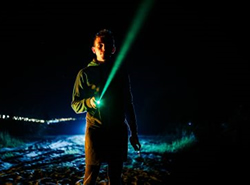 The Australian Radiation Protection and Nuclear Safety Agency (ARPANSA) has raised concerns over illegal laser pointers being allowed into the country due to incorrect product labelling.
The Australian Radiation Protection and Nuclear Safety Agency (ARPANSA) has raised concerns over illegal laser pointers being allowed into the country due to incorrect product labelling.
Scientist at the ARPANSA, Chris Brzozek said in some cases laser pointers more than 100 times the legal power limit were finding their way into consumers’ hands.
He said all laser pointers available to the public must have a radiant power output of less than one milliwatt (1mW). Anything above that is considered a prohibited weapon.
“Unreliable specifications and deliberate misrepresentation of the output power provided at the point of sale are an increasing problem,” Dr Brzozek said.
“A study by the University of NSW found that the vast majority of laser pointers in its sample, 42 out of 44, exceeded the power limit.”
He said ARPANSA’s message to customs brokers, freight forwarders and the sector more broadly was to double-check product labels. Laser pointers without a label or that were labelled incorrectly could be referred to the authorities.
“We also say to consumers to be careful, especially when laser products are used by children,” Dr Brzozek said.
“Humans have a blink reflex that can protect the eye from a laser beam with a radiant power of 1mW or below, but that aversion response has limited effectiveness to prevent hazards when laser beams are above 1mW.”
He said when a laser pointer was shone into the eyes of an unsuspecting victim, it could have a ‘flash-blindness effect’. Flashed into the eye of someone driving or operating machinery could result in their death.
“Even for people not doing safety-critical activities, the injury from staring into a laser beam could include permanent damage to their eye, resulting in vision loss.
Powerful laser pointers can also burn the skin,” the scientist said.
Dr Brzozek will be speaking on the issue to the supply-chain sector as part of a series of compliance training workshops throughout May and June.
The work forms part of ARPANSA’s role as a health advisor, working to protect people and the environment from the harmful effects of radiation.


